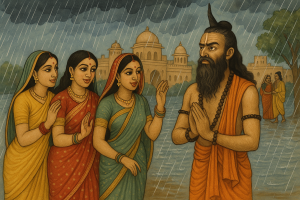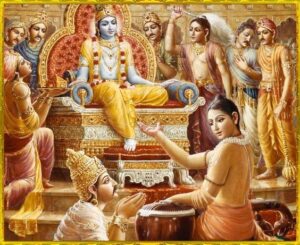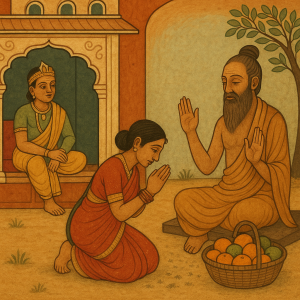The Question of Generosity
In the midst of an ancient Indian epic, the famed warrior Arjuna, accompanied by his divine charioteer Krishna, questioned Krishna about the noblest giver in the land. Without hesitation, Krishna named Karna, Arjuna’s greatest rival on the battlefield, as the finest example of generosity in the kingdom. This answer did not sit well with Arjuna, who was irked by the thought that his rival could be more generous than himself. However, he said nothing, though Krishna noticed the competitive gleam in his eyes.
Krishna, ever wise and perceptive, decided to teach Arjuna a valuable lesson. A few days later, as they were riding together one evening, Krishna pointed to two distant mountains. As Arjuna looked at them, the peaks began to shimmer and reflect the light, turning into solid gold.
“Now Arjuna,” Krishna said, “I have a task for you. You must distribute these two mountains of gold among the poor villagers who live in the foothills. Let me know when you have given away every last pebble of it.”
Arjuna’s Effort
Eager to prove his generosity, Arjuna summoned all the villagers together and grandly announced that he would be distributing the two glorious mountains of gold among them. The villagers were awestruck, and songs of praise for Arjuna filled the air. Energized by the admiration, Arjuna began shoveling gold from the mountain, determined to give it all away.
For two straight days and nights, Arjuna worked tirelessly, without stopping for food, water, rest, or sleep. But to his utter dismay, the mountains of gold remained as immense as ever. The more he shoveled, the more gold there seemed to be. Exhausted and baffled, Arjuna sought Krishna out and confessed that he needed rest before he could continue.
Karna’s Approach
In response, Krishna summoned Karna and presented him with the same task. “Do you see those two mountains?” Krishna asked. “Yes,” Karna replied. “You must distribute them among the poor villagers who live in the foothills. Let me know when you have given away every last pebble of it.”
Without a moment’s hesitation, Karna called out to two villagers who happened to be passing by. “Do you see those two mountains?” he asked them. “Yes,” they responded. “Those two mountains of gold are yours to do with as you please,” Karna said with a smile as bright as the sunrise. Having said this, Karna bowed to Krishna and walked away without looking back.
Arjuna was left dumbfounded by Karna’s effortless and swift act of giving.
Krishna’s Lesson
Seeing Arjuna’s astonishment, Krishna turned to him, his voice rich with wisdom. “Arjuna,” Krishna said, “in your mind, the gold occupied a place of high value, and you were subconsciously attracted to it. Your approach to giving was muddied by calculations and the desire to strategize, deciding who was most deserving of the gift. But these petty calculations tired your spirit, and over time, you realized that the mountains’ abundance was far beyond the capacity of your individual head, heart, and hands.”
Arjuna absorbed the truth of Krishna’s words, realizing the flaws in his approach.
“And what about Karna?” Arjuna finally asked.
“The gold meant nothing to Karna,” Krishna replied. “For him, the true gift was not the gold but the act of giving itself. He had no calculations to make, nor was he seeking anything in return—no acknowledgment, no praise. He offered everything with a clear heart and a pure mind, and having given, he moved on to meet the next moment. That, dear Arjuna, is the true sign of a person on the path of Awakening.”
Lessons to Be Learned from the Story
- The True Spirit of Giving: Karna’s effortless act of giving demonstrates that true generosity lies not in the material value of what is given but in the purity of the act itself. The intention behind the giving is what truly matters.
- Detachment from Material Wealth: The story highlights the importance of detachment from material possessions. Karna’s ability to give without hesitation, without attachment, and without seeking recognition is a mark of true spiritual maturity.
- The Dangers of Ego and Calculation: Arjuna’s approach to giving was clouded by his desire for recognition and his tendency to strategize. The story teaches that true generosity cannot be measured or calculated; it must flow freely from the heart.
- Contentment and Moving On: Karna’s ability to give and then move on without dwelling on his actions illustrates the importance of contentment and living in the present moment. True giving is complete when one does not look back or seek validation.
- Spiritual Awakening Through Selflessness: Krishna’s lesson to Arjuna underscores the idea that selflessness and pure intentions are key attributes on the path to spiritual awakening. Karna’s selfless giving is a reflection of his alignment with higher spiritual truths.
This tale serves as a powerful reminder that the essence of giving is not in the material value of the gift but in the spirit with which it is given. True generosity is an act of the heart, untainted by ego or desire for recognition, and it is this quality that marks the path of a truly awakened soul.



